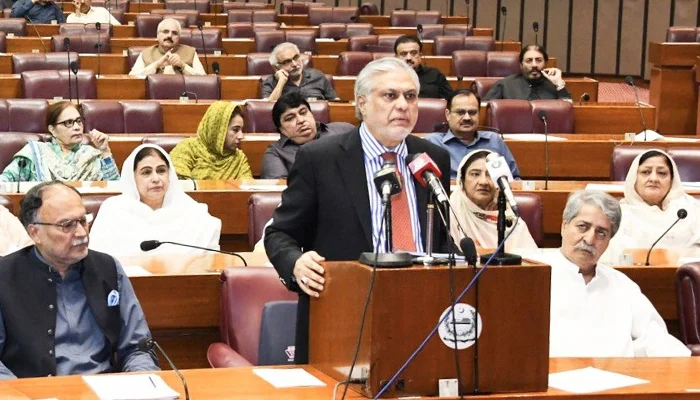NA approves IMF-dictated budget FY24

As the country seeks external financing to prevent a sovereign default, the National Assembly passed the fiscal year 2023-24 budget Sunday after making all the necessary amendments.
According to Finance Minister Ishaq Dar, the government introduced a number of changes to its budget for the fiscal year 2024 in an attempt to conclude a stalled rescue package with the IMF.
As a last-ditch effort to save the IMF loan, the government introduces a number of changes to its budget
Submitted by Waqar Satti
In June 2023,
A speech by Finance Minister Ishaq Dar in the National Assembly in Islamabad, on June 24, 2023. You can follow us on Twitter at @FinMinistryPak
SLAMABAD: Following the IMF’s (International Monetary Fund) revisions, the National Assembly on Sunday passed the budget for fiscal year 2023-24.
As part of its last-ditch effort to reach an agreement with the IMF, the government has made several changes to its budget for fiscal year 2024, Finance Minister Ishaq Dar confirmed.
A number of other measures will be taken to shrink the fiscal deficit during the fiscal year starting next month, including increasing taxes by Rs215 billion and cutting spending by Rs85 billion.
Takeaways from the presentation
Rs14,480 trillion is the total outlay of the budget
Rs9,415 billion has been added to the tax target
A total of Rs801 billion is allocated for pensioners by the government
It increased to Rs5,390 billion in NFC
A new tax worth Rs215 billion has been introduced
A total of Rs466 billion has been allocated for the BISP programme
A total of Rs900 billion will be spent on public sector development
“This was a huge burden for the cash-strapped country,” the finance minister said during today’s session.
It has been ruled that only one pension will be available to government employees from grades 17 to 22, the finance minister said, noting that it would not apply to those below grade 17.
Dar, who has served as finance minister several times, said that the issue of former government employees withdrawing more than one pension is old. It must be resolved.
A majority of the House rejected Maulana Abdul Akbar Chitrali’s demand that the Finance Bill 2023-24 be referred to the Council of Islamic Ideology before approval.
Shehbaz Sharif met with Kristalina Georgieva, IMF Managing Director, during the Paris Global Financing Summit, which led to the decision to amend the budget.
“We had detailed talks with the IMF as a last effort to complete the pending review,” the financial czar told the lower house.
A number of changes will be made to the government’s budget for 2024 as a result of the negotiations, he explained.
Besides collecting Rs215 billion in new taxes, Dar said that they would reduce spending by Rs85 billion. Several steps will be taken to shrink the fiscal year’s budget beginning in July, according to him.
According to the federal minister, Pakistan has agreed to pay Rs215 billion in taxes after three days of talks with IMF officials in order to complete the 9th EFF review.
According to him, the final taxes for the fiscal year 2023-24, went down to Rs215 as a result of the talks with the IMF, ensuring that the poor and middle classes would not be burdened.
According to him, Pakistan would reduce running expenditures by Rs 85 billion without affecting the development budget or employee salaries and pensions.
Government officials held talks with the international lender with utmost sincerity, and he assured parliament that the agreement would be published on the Ministry of Finance’s official website once it had been reached with the international lender.
Accordingly, he said the Federal Board of Revenue (FBR) had increased its proposed tax collection target from Rs9.2 trillion to Rs9.415 trillion, with a provincial share of Rs5.276 trillion to Rs5.390 trillion. The total expenditure estimate of the federal government has increased from Rs14.460 trillion to Rs14.480 trillion, while the pension estimate has increased from Rs761 billion to Rs801 billion.
Additionally, he said the subsidy estimate would be Rs1.064 trillion and the grant estimate would be Rs1.405 trillion. As a result, the overall budget deficit would be reduced by Rs300 billion [tax reductions of Rs215 billion and running expenditure reductions of Rs85 billion].
